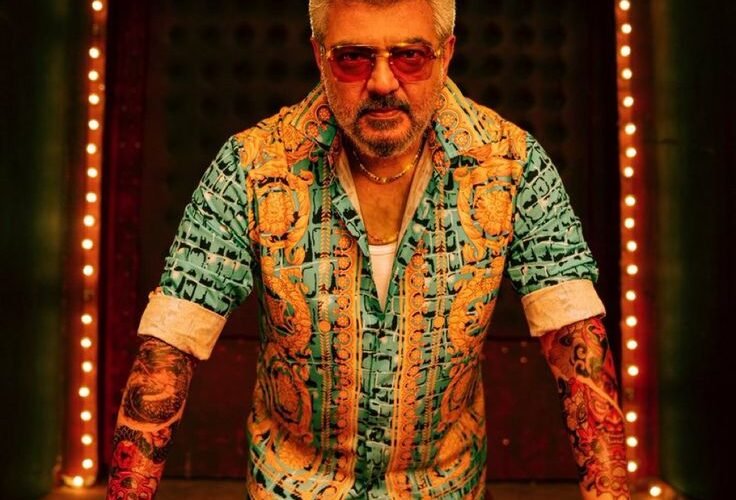Good Bad Ugly Movie Review – A Detailed Analysis

Released on April 10, 2025, Good Bad Ugly hit theaters with a bang, especially among Tamil cinema fans. Directed by Adhik Ravichandran and starring Ajith Kumar in the lead role, the film instantly captured the attention of the masses. With a power-packed cast including Trisha Krishnan, Arjun Das, Jackie Shroff, Sunil, Tinnu Anand, Yogi Babu, and Prabhu, the film generated high expectations. As the title suggests, the film attempts to explore different shades of morality and redemption, set within a high-stakes, action-packed narrative. Let’s break down the film’s various elements to understand why it works—or fails—in parts.
Plot Summary
Ajith Kumar portrays AK, a once-feared don who now leads a reformed life focused on his family. He walks away from his violent past, hoping for peace. However, when a gang abducts his son, AK’s peaceful world shatters. Forced back into the dark underworld, he embarks on a mission to rescue his child, confronting enemies from the past and navigating betrayal, bloodshed, and vengeance.
The storyline thrives on the classic conflict between good and evil, but adds emotional tension by placing a father’s love at its core. This gives AK’s actions depth and moral complexity. The plot, however, takes a predictable turn midway, relying heavily on cinematic tropes and slow-motion sequences. The narrative attempts to balance emotion and action, but leans more toward style than substance in many parts.
Ajith Kumar Steals the Show
Ajith Kumar delivers a commanding performance. His screen presence, charisma, and ability to switch between tenderness and aggression bring AK to life. He dives deep into the character’s internal conflict—between a reformed father and a ruthless gangster—with intensity and conviction. Every punch he throws and every line he delivers carries weight, thanks to his grounded portrayal.
The film gives him plenty of hero elevation moments, often with slow-motion entries, dramatic monologues, and high-octane action scenes. While fans may celebrate these scenes, some viewers might find them excessive. Still, Ajith stands tall, shouldering most of the film’s emotional and narrative weight.
Supporting Cast: Missed Opportunities
Trisha Krishnan plays AK’s wife with elegance but receives minimal screen time. Her character feels underwritten, and the film doesn’t explore her emotional struggles or her relationship with AK in any meaningful way. Arjun Das plays the main antagonist with sharp intensity. His performance adds menace and grit to the film, making him a formidable opponent.
Veteran actors like Jackie Shroff, Sunil, and Tinnu Anand perform competently, but the film doesn’t give them enough room to shine. Yogi Babu provides some comic relief, although his scenes feel forced at times. Prabhu’s presence adds gravity, but the script does not fully utilize his experience and talent. Overall, the supporting cast performs well within the constraints of their limited roles.
Direction and Cinematic Style
Director Adhik Ravichandran aims to deliver a stylish action drama tailored for mass entertainment. He succeeds in creating several visually stunning moments, especially during action scenes. However, his over-reliance on slow-motion shots, exaggerated sequences, and hero glorification scenes often interrupts the pacing.
The film begins with promise but drags in the middle due to repetitive scenes. Some emotional beats feel unearned, and the transitions between past and present lack fluidity. While the director attempts to inject sentiment into the story, the film’s focus stays rooted in action, often sidelining character development.
Cinematography and Editing
The cinematography stands out as one of the film’s strongest aspects. The camera captures the stark contrast between AK’s calm domestic life and the violent world he returns to. The use of shadows, colors, and wide-angle shots builds mood and tension effectively. Action sequences, particularly the chase and fight scenes, appear well-crafted and immersive.
On the downside, the editing lacks tightness. Scenes overstay their welcome, and the narrative could have flowed better with sharper cuts. At times, the film slows down unnecessarily, especially during montages and dramatic pauses.
Music and Sound Design
GV Prakash Kumar’s background score boosts the film’s dramatic tension. His work underlines every action sequence and emotional scene with the right intensity. The music amplifies key moments without overwhelming them. The soundtrack includes a few situational songs, but they don’t leave a lasting impression outside the theater. While functional within the story, they don’t break new ground musically.
Critical Reception
Critics responded to the film with mixed reviews. Most praised Ajith Kumar’s performance and the film’s stylish presentation, but they also pointed out its narrative shortcomings. Viewers found the story formulaic and the emotional scenes rushed or superficial. Critics also highlighted the imbalance between storytelling and fan service, noting that the film primarily targets Ajith’s fanbase rather than a broader audience.
Box Office Performance
Despite mixed reviews, Good Bad Ugly performed impressively at the box office. On its opening day, it earned around ₹16.64 crore across India, confirming Ajith Kumar’s draw at the ticket counter. The Tamil version saw an average occupancy of over 77% on day one, with certain regions reporting up to 81% occupancy during afternoon shows.
The film recorded pre-sales of nearly ₹19 crore and sold close to one million tickets before its release. These numbers made it the second-highest day-one advance booking for an Indian film in 2025, just behind Game Changer starring Ram Charan. The movie’s commercial success underscores Ajith Kumar’s consistent star power and the loyalty of his fanbase.
Final Verdict
Good Bad Ugly thrives on style, star power, and fan service. Ajith Kumar carries the film on his shoulders, delivering a powerful performance that keeps the audience engaged. The film looks slick, sounds dramatic, and hits hard during action sequences.
However, it falls short when it comes to storytelling. Weak character arcs, an overemphasis on slow-motion heroics, and underdeveloped emotional subplots prevent the film from reaching its full potential. Fans of Ajith will find plenty to cheer for, but viewers looking for a layered narrative might walk away wanting more.
If you crave high-voltage action and larger-than-life moments, this film delivers. If you seek emotional depth and strong storytelling, you may need to temper your expectations.
Rating: 3/5
Watch for Ajith Kumar. Stay for the style. Skip if you want substance.













